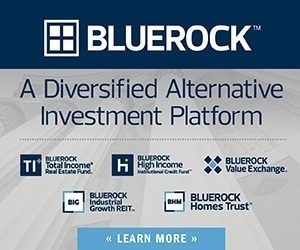What are Some ‘Cons’ to Owning Nontraded REITs?
May 19, 2017 | by Beth Glavosek | Blue Vault

We’ve been looking at the merits of nontraded REITs for individual investors, including the opportunity for potentially higher yields, dividend distributions, diversification, a potential inflation hedge, and owning high quality, commercial grade, professionally managed properties.
However, as with any investment, there are risks and suitability concerns. Nontraded REITs may not be for everyone. Let’s look at some considerations that investors should be aware of before buying shares of a nontraded REIT.
Illiquidity
This is perhaps one of the top concerns expressed by investors. Their money is likely to be committed to the REIT for at least seven years – the average time that it takes for a REIT to mature and consider its exit strategy. While there typically are provisions for share redemption in the event of shareholder death or disability, the expectation is that the investor will leave the money alone as the REIT builds its portfolio.
As we’ve said before, illiquidity doesn’t have to be a negative. Knowing that money in the investment is not readily available for a period of time may mitigate the impulse to trade in and out of the market when market emotions are running high. However, investors should know what they’re getting into and be prepared to leave the investment untouched for a period of time.
Market risk
Nontraded REITs can be affected by factors such as market ups and downs, supply and demand, adverse economic climates, and regulatory changes. There is the chance that when shares are eventually sold, they may be worth more or less than what was paid for them.
Fees and expenses
Nontraded REITs have come under criticism because their fee structures are more costly than less expensive investment products like no-load mutual funds. The sales load paid upfront through the purchase of A shares, for example, is used to compensate the advisor and other entities associated with the investment offering. As a result, a $10 A share may result in $8.50 or so going “in the ground” in actual real estate. It’s uncertain when the REIT will overcome this load and bring share value back to (or above) the price paid.
The fairly recent introduction of nontraded REITs with lower fees and multiple share classes that don’t charge as high of an upfront fee has somewhat mitigated these concerns.
Transparency
Unlike publicly traded REITs, nontraded REITs have historically not offered a great deal of visibility into portfolio or share value, unless the REIT has opted for a third party appraisal or valuation. However, as with the changes in fees, nontraded REITs are evolving to provide more frequent valuations, especially for those known as Daily NAV/Interval Funds. FINRA now mandates third-party appraisals of a REIT’s share net asset values within 29 months following the breaking of escrow of the public offering.
In upcoming posts, we will continue to look at the relative pros and cons of nontraded REITs from the standpoints of financial advisors and investors.












